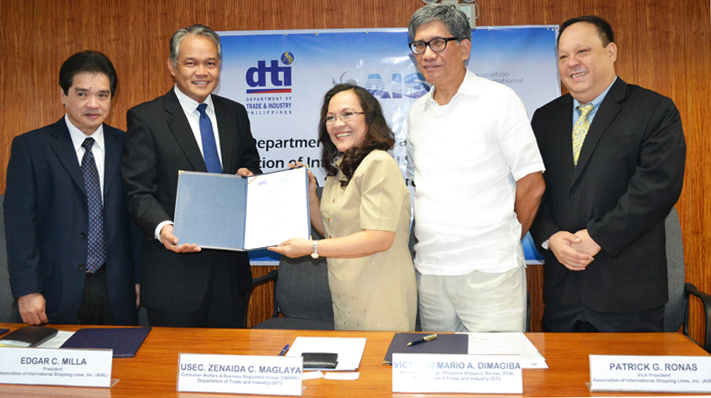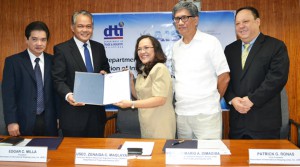

FOREIGN shipping lines servicing the Philippines are teaming up with the government to weed out freight forwarders who fail to deliver balikbayan (personal effects) boxes to their local consignees.
The Association of International Shipping Lines (AISL) recently signed a memorandum of agreement (MOA) with the Philippine Department of Trade on measures that shipping lines can take to help resolve the problem of undelivered door-to-door boxes.
“With this MOA, we’re now working with the government in trying to weed out not legitimate” (freight forwarders), Edgar Milla, AISL president, said at signing of the agreement at the DTI offices in Makati.
Signing for the DTI was Trade Undersecretary Zenaida Maglaya of the department’s Consumer Welfare and Business Regulation Group.
The campaign against illegitimate freight forwarders and consolidators is being stepped up by the Philippine Shippers’ Bureau (PSB), a unit of the DTI, in response to increasing complaints from families of overseas Filipinos about undelivered boxes.
The cooperation takes effect immediately, the DTI said. Maglaya said the partnership with the foreign liners will be based on information exchange about local door-to-door cargo firms and their international partners.
As part of the campaign, shipping lines will ask the foreign consolidator/forwarder two questions: “Are you accredited in this country and is your agent in the Philippines accredited?”
If the answer is “yes,” the shipping line will ask for the PSB accreditation number, said the bureau’s director-in-charge, Atty. Victorio Mario Dimagiba. “If they can’t answer that, the carrier abroad may refuse a particular box,” Dimagiba said.
Dimagiba said in the first half of this year, the agency has received 73 complaints about undelivered balikbayan boxes.
Citing DTI data, he said for full-year 2012, there were 153 cases of non-delivery of boxes shipped from various origins worldwide, of which 60 were resolved through PSB intervention, eight withdrawn, 41 elevated to local courts, four endorsed for arbitration, seven issued show-cause orders, and 14 still for DTI-PSB’s disposition because additional information from the complainants are needed.
Dimagiba said the undelivered boxes were either pilfered in transit or seized and disposed of by the Bureau of Customs because foreign forwarders did not remit payment for customs fees.
As of 31 March 2013, there are 632 PSB-accredited freight forwarding companies: 422 are classified as non-vessel common carriers, 590 international freight forwarders, and 157 domestic freight forwarders.
“The signing of the MOA today will be circulated to all member lines tomorrow (on July 11) for their information and guidance. Once brought to their attention, member lines will now be more cautious in accepting balikbayan shipments for loading,” said Atty. Maximino Cruz, general manager of AISL, which groups 41 global carriers operating in the Philippines.
“They will be guided, however, by the list furnished to us by PSB-DTI or through the PSB website. It needs to be stressed that the success of this undertaking depends heavily on the closer collaboration between PSB-DTI and AISL,” Cruz said.
“The MOA was duly presented before the AISL board and membership and obtained their imprimatur. While the agreement merely states that AISL shall encourage and, as often as possible, remind member lines to screen balikbayan boxes guided by the PSB-DTI survey questionnaire, it carries the sincere intention of AISL members to assist the government in curbing abuses committed against our overseas contract workers and their loved ones,” he said.
“The AISL is going to be informed of some of these complained about (forwarders) and they (AISL) will make sure that these companies who are having problems in the Philippines are not patronized,” Maglaya said.
She said the shipping lines have no police powers to act against erring forwarders, “but they would be able to alert members of the industry” and Filipinos abroad about these illegitimate operators. — Text and photo by Roumina Pablo




